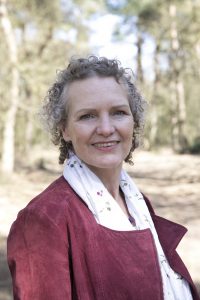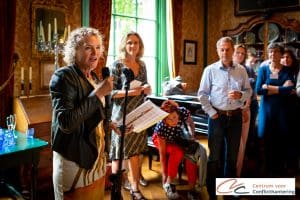Spreading the Seed of Mediation. Member Spotlight: Linda Reijerkerk
“What if a mediator had been here?” is the central question that Linda poses to her audience during the Centrum voor Conflicthantering (CvC) Mediation Conflict Tour©, an initiative bringing ordinary citizens to know more about the world and the role that mediation can play even in our daily lives. “We started organizing this Tour to make people realize what mediation can do for them in everyday life and that mediations goes beyond family and divorce.” Her desire to overcome prejudices by showing the strengths of mediation drove Linda to design theTour across various cities both in the Netherlands and abroad, visiting places where conflict took place and demonstrating to the audience how such dispute could have been resolved more effectively if a mediator had been involved. The CvC Mediation Conflict Tour© is just one of the few ground-breaking initiatives arisen by the visionary mind of Linda, whose main commitment is to spread the seed of mediation at every level of our society in a double folded way: by raising awareness in the public on the importance of mediation and by accurately training aspirant mediators according the highest possible standards.
Linda’s Curriculum: A Pioneering Mind
 Linda’s interest in mediation comes from afar. While she graduated in both Anthropology and Environmental Management, her career-focused immediately on the latter specialization. She worked for many years traveling overseas for an engineering company engaging in multi-stakeholder processes. Due to family reasons, she finally decided to settle in the Netherlands and started to get involved in meditation-like activities in her own country. “I realized that what I was doing with my firm overseas, namely multi-stakeholder processes and community involvement was quite unknown in The Netherlands,” she admits.
Linda’s interest in mediation comes from afar. While she graduated in both Anthropology and Environmental Management, her career-focused immediately on the latter specialization. She worked for many years traveling overseas for an engineering company engaging in multi-stakeholder processes. Due to family reasons, she finally decided to settle in the Netherlands and started to get involved in meditation-like activities in her own country. “I realized that what I was doing with my firm overseas, namely multi-stakeholder processes and community involvement was quite unknown in The Netherlands,” she admits.
In the mid-90s, a resounding case in the Netherlands concerning a litigation process started by a community whose lands had been flooded by an overflowing river due to climate change ignited a spark in Linda’s mind. She had always kept environmental issues at her heart and by reading a book on managing environmental disputes she finally realized that mediation represented the right path for her. “At that time, mediation was pretty new in The Netherlands,” she says, realizing that even her former colleagues at the engineering company were quite skeptical on this turn.
Over the years, Linda made a name for herself in the mediation field, becoming one of the most renown figures in the Netherlands and obtaining the position of Director of the Centre for Conflict Resolution, a top-3 Dutch company specialized in training on mediation, negotiation, and coaching. In this role, she pioneered initiatives such as the Dutch Business Mediation Competition, the Mediation Academic Pitch and the Dutch Mediation Festival, among others.
Mediator in Action: Between Environment, Culture, and Business
In her more than 20 years in the field, Linda developed wide expertise in various areas of mediation. Since the very beginning of her career, she has been deeply involved in environmental cases, mediating some of the major disputes in the Netherlands and abroad. Particularly, her curriculum counts numerous examples of water diplomacy, an area that stands out as increasingly important considering the current impact of climate change in many parts of the globe.
“Water is a life necessity, it may represent a source of power and therefore of conflict, but people should understand that it can be a source of cooperation instead” she states confidently, “if you look at The Netherlands, the Water Authorities and the dikes, you have a clear example of how people can cooperate instead of having a conflict.”
Linda confesses to be incredibly satisfied when she manages to join her major passion for intercultural mediation, stemming from her anthropological studies, with environmental and water disputes, especially involving multi-stakeholder processes. She is amazed by how these two areas entwine: “In many cultures, water has a cultural meaning and depth; it is seen as a source of life and often a source of spirituality, and you can use these connotations to create bridges among parties in conflict.” Finally, as mentioned above, Linda is a pioneering practitioner and trainer on business mediation, which was scarcely considered in the Netherlands.
“Being a Mediator Means also Starting a Business”
 To be a mediator is no easy job. First and foremost, bravery and desire to get involved are fundamental requirements: “A mediator should go where the heat is,” to quote Kenneth Cloke, one of the most prominent figures of our times in the world of mediation. Secondly, according to Linda “aspirant mediators should understand that becoming a professional mediator means starting a business.” In other words, being an expert in the field is not enough, but managerial and business skills are required to be successful in this ambition.
To be a mediator is no easy job. First and foremost, bravery and desire to get involved are fundamental requirements: “A mediator should go where the heat is,” to quote Kenneth Cloke, one of the most prominent figures of our times in the world of mediation. Secondly, according to Linda “aspirant mediators should understand that becoming a professional mediator means starting a business.” In other words, being an expert in the field is not enough, but managerial and business skills are required to be successful in this ambition.
It is precisely for this reason that as a Director of the Centre for Conflict Resolution, Linda put great emphasis on quality-control mechanisms for mediators in the Netherlands and elsewhere, in order to prepare future mediators. Through a long procedure of training, supervised practice, peer mentoring and accreditation mechanisms, future mediators are formed at best even from the perspective of facing business challenges. “To be a mediator you also need to be an entrepreneur, to ‘sell’ your services,” she acknowledges.
Balancing Supply and Demand
What is remarkable about Linda’s commitment to mediation is her desire to “spread the seed” contributing to create more peaceful societies by both training high-quality mediators and – on the other hand – raising awareness in the public on the importance of mediation in our daily lives. She is pushed by the fact that the supply of mediators outmatches the demand, and too often the quality of mediation does not live up to the standards required by such critical activity. On the other hand, initiatives such as the Mediation Conflict Tour or the establishment of the first Professorat in Mediation in the Netherlands aim at promoting and making mediation more developed on the demand side.
Having this question at her heart, Linda joined MBBI with the aim of contributing to bringing mediation where this is still unknown or scarcely considered. The reason why Linda retains mediation so unique? The capacity to build trust. “The main difference between mediation and other processes of resolving disputes is trust-building. By saying yes to mediation and to a mediator, the parties of a conflict get already closer in their relationship and ignite a little spark to trust each other.”
Written by Matteo Piovacari: MBBI Writer
